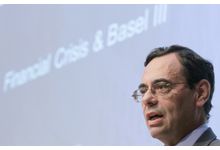The advent of tougher regulations are forcing banks in Asia to charge more for the derivative contracts that have helped drive international bond sales to record levels this year.
Charges associated with cross-currency basis swaps, financial instruments that allow issuers to convert an international bond into a local currency liability, have gone up significantly this year, and are still rising, according to the head of funding for an Asia-Pacific sovereign.
“It used to be straightforward. You’d look at a screen, see the current basis swap, add a small fee and you would have an idea of your swapped cost,” said the funding official. “Now, banks have started piling up charges that add up to 40bp–50bp, sometimes making some transactions uneconomical.”
The additional costs come from capital charges and credit-valuation adjustments, essentially a way to price in counterparty risk, under the forthcoming Basel III rules on bank capital.
The impact of the extra expenses may be magnified in Asia, where issuers often borrow at a fixed coupon in US dollars and use derivatives to convert their liabilities to a local floating rate. Extraordinarily low US interest rates have sent dollar bond sales from Asia, excluding Japan and Australia, to a record of well over US$100bn this year, and additional swap costs will add to questions over whether or not such a run rate is sustainable.
Bankers said that, in the past, institutions routinely excluded or minimised these cost components when they quoted basis swaps rates to clients on debt deals. It gave them a competitive edge at times and often also pushed other banks to reduce the quoted prices on their basis swaps. As a result, the prices of basis swaps did not always match the ultimate costs to the banks.
Every dollar counts
The planned rollout of the first set of Basel III regulations in January, however, has made every dollar dearer to banks, forcing them to pass on some of the additional costs.
“Under Basel III, these swaps eat into your capital,” explained a syndicate banker in Singapore. “They are very strict on capital charges and CVA now.”
Depending on the existing exposure to a certain credit, the bank offering the basis swap may also have to require the client to post collateral to back the basis swap. Treasurers, bankers said, were notoriously averse to collateral posting.
Without the underlying collateral, banks may have to give the swap full risk weighting, adding to the burden of the capital charge.
Basel III has just made the basis swap a more complicated undertaking from a risk management perspective, as well. Banks currently hedge exposures to basis-swap counterparties through reverse swaps or through buying CDS on the issuer they deal with. Under the new regulations, they will incur capital charges on both sides of the trade, making their risk management more costly.
With so many parts involved, the less liquid the credit, the more costly the transaction.
“The costs have been going up,” said a senior syndicate banker in Hong Kong.
Liquidity lacking
The problem is exacerbated in Asia’s local currency swap markets, where bankers have seen liquidity dwindle and operational costs rise. Swaps traders in Asia have already noticed that banks are dropping out of these kinds of trades because of Basel III.
“In the past two months, it has been mostly client flow, banks have hardly shown up,” said a derivatives trader in Singapore.
As financial institutions exit the market, the lack of liquidity is further adding to the cost – and banks are passing that on to clients. Apart from the yen-dollar market, bankers said that most of the cross-currency markets were already illiquid, especially in the longer tenors required for hedging bonds.
However, in the past few months, bid/offer spreads for the foreign exchange derivatives of some pairs had widened substantially.
The bid/offer spread for the six-month Korean won versus the US dollar, for instance, is now at 60bp. The actual quote for the swap also has more than doubled from about 1.3pt to 2.7pt.
“As we go on to Basel III standards, I will not be surprised if prices increase go up (even more),” said the Hong Kong banker.

